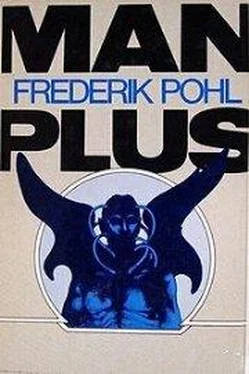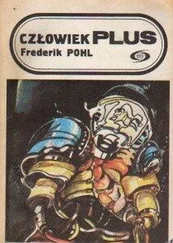When he came to think of it after, he realized that they were the pieces that might have spilled or broken. He had let the wax crayons fall free. In that fraction of a second of choice, he had chosen to catch the objects that needed catching and let the others go, without being aware of what he did.
Brad was highly pleased. “You’re doing great, boy,” he said, holding to the foot of the bed. “I’m going to take off now and get some sleep, but I’ll be in to see you tomorrow after the surgery.”
“Surgery? What surgery?”
“Oh,” said Brad, “just a little touch-up. Nothing compared to what you’ve already had, believe me! From now on,” he said, turning to leave, “you’re just about through being born; now all you have to do is grow up. Practice. Learn to use what you’ve got. The hard parts are all behind you. How are you doing with cutting off vision when you want to?”
“Brad,” rang out the flat voice, louder in amplitude but tonally gray, “what the hell do you want of me? I’m trying!”
“I know,” Brad said, conciliating. “See you tomorrow.”
For the first time that day Roger was left alone. He experimented with his new senses. He could see that they might be very useful to him in survival situations. But they were also very confusing. All the tiny noises of everyday life were magnified. From the hall he could hear Brad talking to Jonny Freeling and the nurses going off duty. He knew that with the ears his mother had cultured for him in her womb he would not have been able to perceive even a whisper; now he could make out the words at will: “ — local anesthetic, but I don’t want to. I want him out. He’s got enough trauma to deal with.” That was Freeling talking to Brad.
The lights were more brilliant than before. He tried to diminish the sensitivity of his vision, but nothing happened. What he really wanted, he thought, was a single Christmas-tree bulb. That was plenty of light; these floods of luminosity were disconcerting. Also, he observed, the lights were maddeningly rhythmical; he could perceive each pulse of the sixty-Hertz current. Inside the fluorescent tubes he observed the writhing of a glowing snake of gas. Incandescent bulbs, on the other hand, were almost dark, except for the bright filaments at the center, which he could examine in detail. There was no sense of eyestrain, even when looking at the brightest of lights.
He heard a new voice in the corridor, and sharpened his hearing to listen: Clara Bly, just coming on duty for the evening shift. “How’s the patient, Dr. Freeling?”
“Just fine. He seems rested. You didn’t have to give him a sleeping pill last night?”
“No. He was fine. Kind of” — she giggled — “kind of randy, though. He made a sort of a pass, which I never expected from Roger.”
“Huh.” There was a puzzled pause. “Well, that won’t be a problem any more. I’ve got to check the readouts. Take care.”
Roger thought he would have to be extra nice to Clara; it would not be hard to do, for she was his favorite among the nurses. He lay back, listening to the rustle of his own black wings and the rhythmic sounds from the telemetry panels. He was very tired. It would be nice to sleep—
He sprang up. The lights had stopped! Then they were on again, as soon as he became aware of it.
He had learned to close his eyes!
Satisfied, Roger let himself sink back onto the gently flowing bed. It was true enough; he was learning.
They woke him to feed him, and then to put him to sleep again for his last operation.
There was no anesthesia. “We’re just going to turn you off,” said Jon Freeling. “You won’t feel a thing.” And indeed he didn’t. First he was wheeled into the surgery next door, intensive-care bottles, pipes, drains and all. He could not smell the smell of disinfectant, but he knew it was there; he could perceive the brightness gathered at the cusp of every metallic object, the heat from the sterilizer, like a sunburst against the wall.
And then Dr. Freeling ordered him out, and we complied. We depressed his sensory inputs one by one; to him it was as though the sounds grew fainter, the lights dimmer, the body touches more gentle. We dampened the pain inputs throughout all his new skin, extinguished them completely where Freeling’s knife would cut and needle would pierce. There was a complex problem there. Many of the pain inputs were to be maintained after he recovered. He would have to have some warning system when he was free on the surface of Mars, something to tell him if he was being burned or torn or damaged; pain was the sharpest alarm we could give him. But for much of his body, pain was over. Once we extinguished the inputs we programmed them out of his sensorium entirely.
Roger, of course, knew nothing of this. Roger just went to sleep and woke up again.
When he looked up he screamed.
Freeling, leaning back and flexing his fingers, jumped and dropped his mask. “What’s the matter?”
Roger said, “Jesus! For a minute there I saw — I don’t know. Could it have been a dream? But I saw you all around me, looking down, and you looked like a bunch of ghouls. Skulls. Skeletons. Grinning at me! And then you were you again.”
Freeling looked at Weidner and shrugged. “I think,” he said, “that that’s just your mediation circuits at work. You know? Translating what you see into something you can grasp immediately.”
“I don’t like it,” Roger flared.
“Well, we’ll have to talk to Brad about it. But honestly, Roger, I think that’s the way it’s supposed to be. I think it’s like the computer took your sensations of fear and pain — you know, what everyone feels when he has an operation — and put them together with the visual stimulus: our faces, the masks, all that stuff. Interesting. I wonder how much of it was in the mediation, and how much was plain postoperative delusion?”
“I’m glad you find it interesting,” Roger sulked.
But truthfully, he found it interesting too. When he was back in his own room he let his mind roam. He could not summon the fantasy pictures at will. They came when they wanted to come, but they were not as fearsome as that first terrified glimpse of bare mandibles and hollow eye sockets. When Clara came in with a bedpan and left again after he waved it away, he watched her through the closing door; and the shadow of the door became a cave entrance, and Clara Bly a cave bear growling irritably at him. She was still a little annoyed, he realized; some subsonic cue in her face was registering in his senses, and being analyzed by the buzzing 3070 downstairs and displayed as a warning.
But when she came back she was wearing Dorrie’s face. It melted away and reclothed itself in her familiar dark skin and bright eyes, not like Dorrie at all; but Roger took it as a sign that things were all right between them again…
Between Clara and himself.
Not, he thought, between Dorrie and himself. He gazed at the phone by his bed. The vision circuits were permanently off at his request; he didn’t want to call someone and forget what they might see. But he had not used it to call Dorrie at all. Often enough he reached out his hand for the phone, but every time he drew his hand back.
He didn’t know what to say to her.
How do you ask your wife if she is sleeping with your best friend? You come right out and ask her, that’s how, his gut feelings told Roger; but he could not quite make himself do it. He was not sure enough. He could not risk that accusation; he might be wrong.
The thing was, he couldn’t discuss it with his friends, not any of them. Don Kayman would have been a natural for that; it was a priest’s function. But Don was so clearly, so sweetly and tenderly in love with his pretty little nun that Roger could not put himself in the pain of discussing pain with him.
Читать дальше












